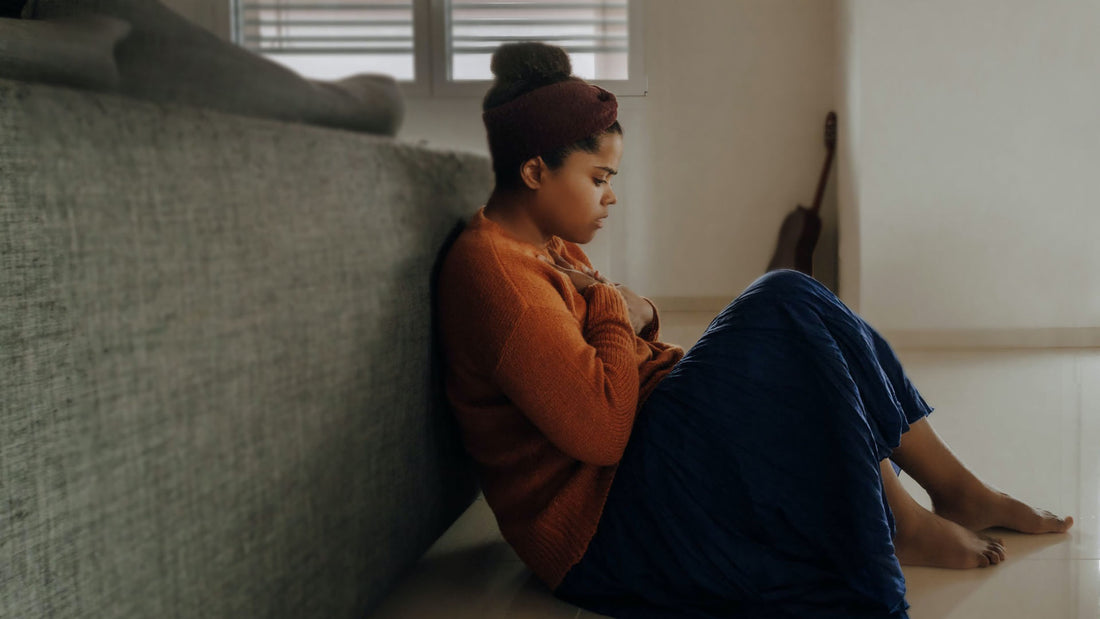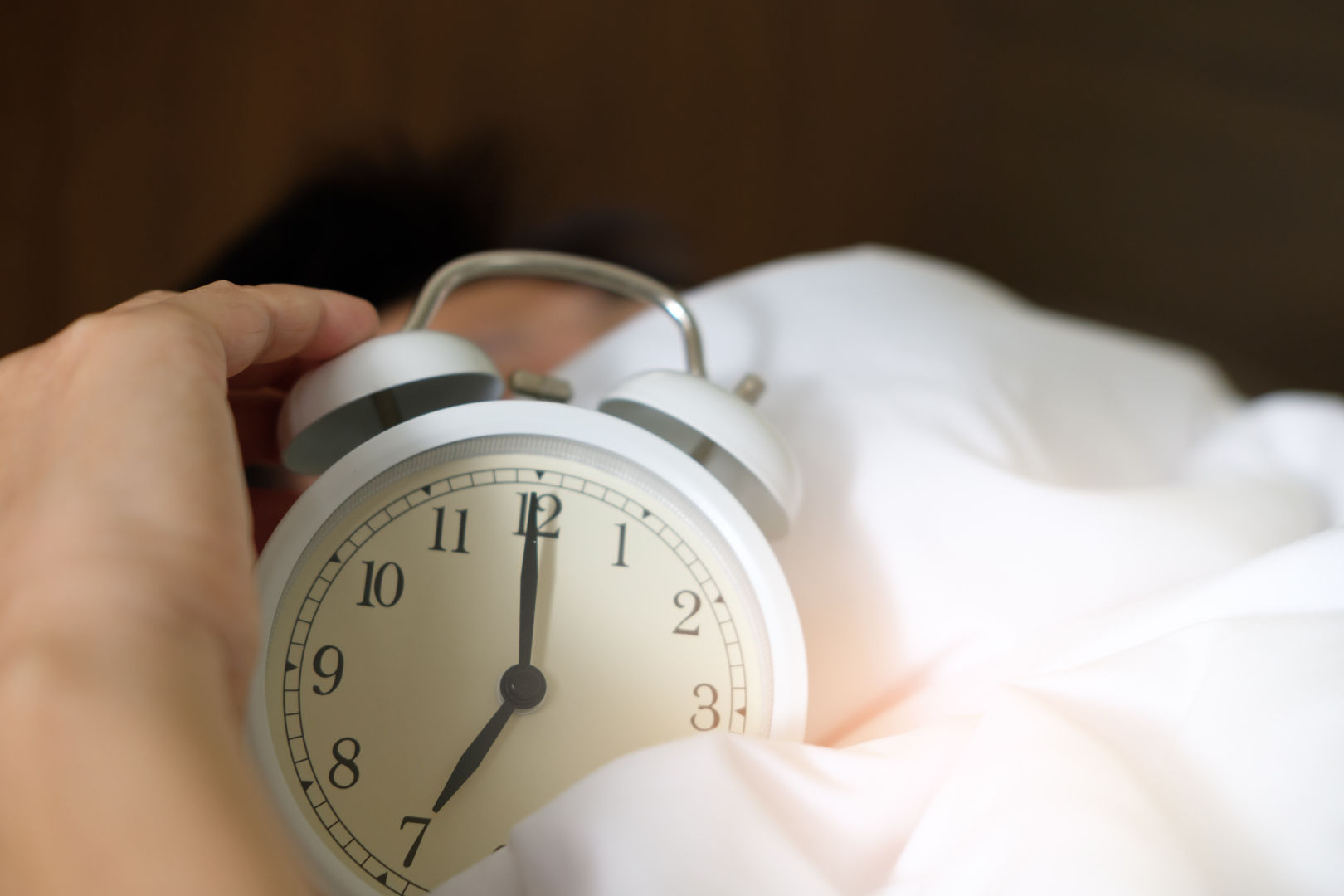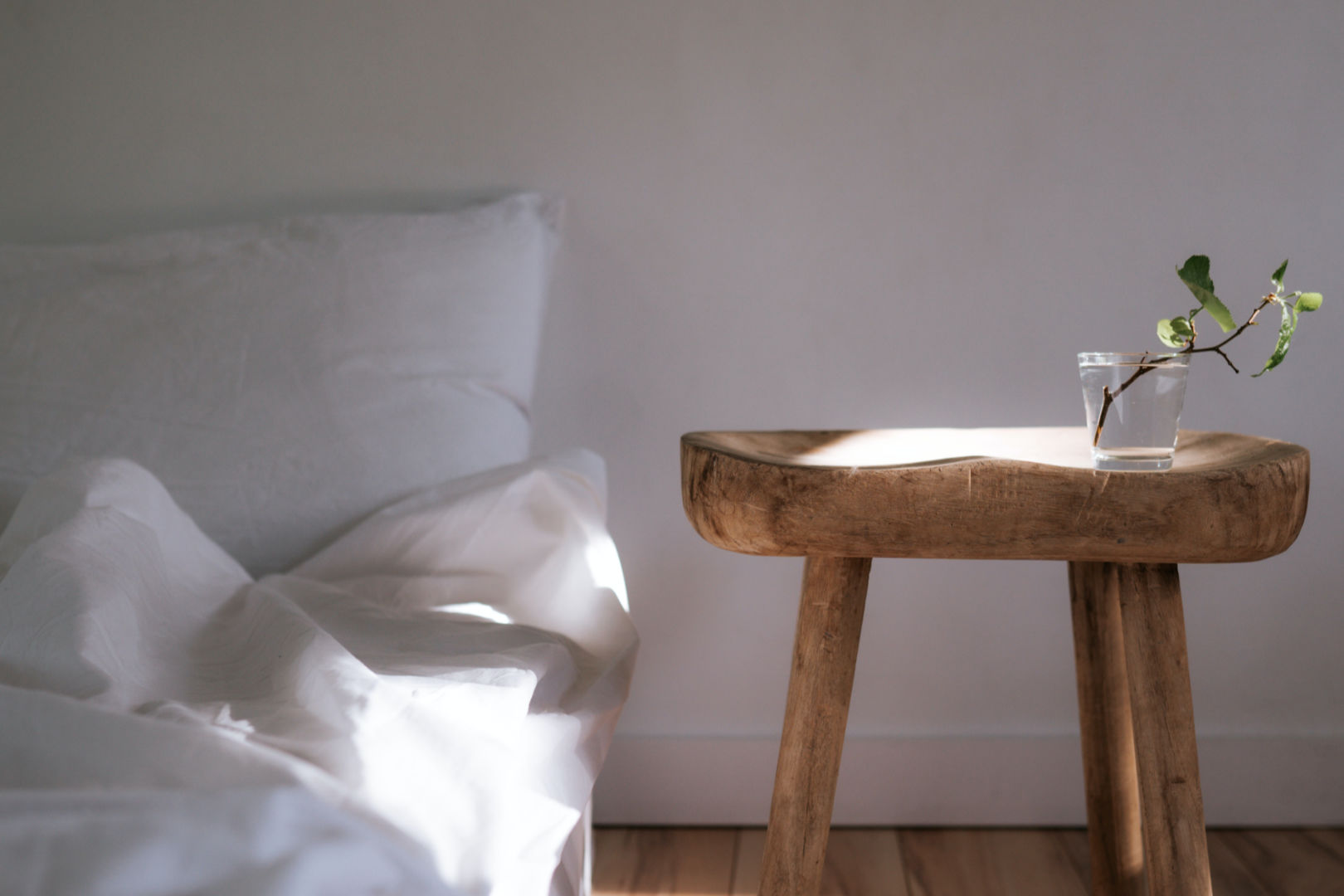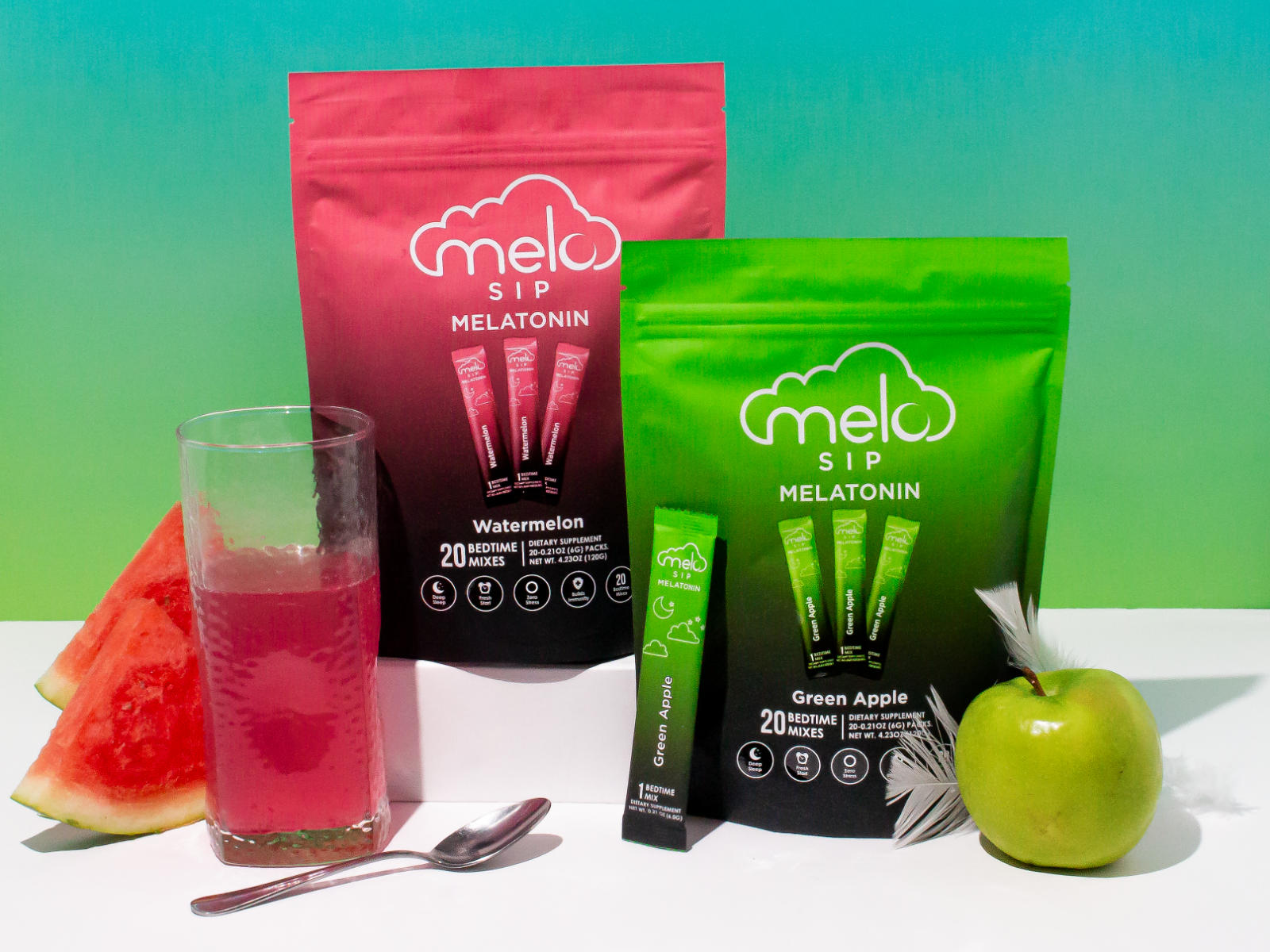
Melatonin for Anxiety: When and How to Take It
If you’re considering taking melatonin for anxiety, you might first consider whether your anxiety symptoms are rooted in sleep disturbances or sleep deprivation. Melatonin is a well-established sleep aid, generally taken to help people fall asleep. That said, it can help with managing anxiety.
Read on to learn how melatonin and anxiety affect each other, when and how to take melatonin for anxiety, and the best melatonin supplements for anxiety.
(Note: Our product, MELO Sip, is specifically designed with anxiety in mind, as it contains several herbal ingredients to help relax you, including chamomile, valerian root, l-theanine, and GABA. It also contains beneficial vitamins and minerals.)
Shop MELO Sip melatonin powder
At a glance:
Melatonin and Anxiety Affect Each Other in Complex Ways

In short, the way melatonin and anxiety interact is complicated. To begin with, it’s helpful to understand more about what exactly melatonin and anxiety are.
Melatonin vs. Anxiety
Melatonin is a sleep aid, but it’s not a strong sedative or tranquilizer. It is a naturally occurring hormone produced by the pineal gland when we sense darkness. It regulates our circadian rhythm (sleep wake cycle) by setting in motion physiological processes to prepare our bodies for sleep. In addition to the natural hormone, melatonin can also be taken as a supplement.
Meanwhile, anxiety is a subjective feeling generally brought on by the body’s stress response. While the stress response is meant to alert us to potential danger, maladaptive stress can become anxiety, potentially lingering long after the stressors are gone.
So how do melatonin and anxiety affect each other? It seems they do opposite things – melatonin prepares us for sleep, while stress and anxiety prepare us for danger – so it’s hard for them both to do their jobs at the same time.
Melatonin Can Help Treat Anxiety or Stress
Evidence suggests taking melatonin can help reduce feelings of anxiety. Some speculate that melatonin helps to alleviate anxiety simply by helping to improve sleep. Improved sleep leads to reduced anxiety. More specifically, melatonin helps regulate our circadian rhythm, so it is ideal for treating circadian rhythm sleep disorders (such as jet lag).
But it does more than that. One of the functions of melatonin is to “shift the balance between the sympathetic and parasympathetic nervous system in favor of the parasympathetic nervous system,” according to a study from the International Journal of Molecular Sciences.
What this means is that melatonin takes us out of “fight or flight” mode (via the sympathetic nervous system) and helps transition us into “rest and digest” mode (via the parasympathetic nervous system). This suggests melatonin essentially blocks the innate stress response, which can theoretically help relieve feelings of anxiety.
A systematic review from the Association of Anesthetists found melatonin could help to reduce oxidative stress as well as feelings of anxiety. Oxidative stress refers to an overabundance of free radicals as compared to antioxidants in the body. Melatonin behaves as an antioxidant, neutralizing free radicals.
Additionally, melatonin was found to reduce peri-operative anxiety (feelings of anxiety during surgery) by an average of 19 points out of a possible 100, according to patient survey data. However, the reviewers note that the studies analyzed in this review had extremely heterogeneous data, and more research is needed to bolster these findings.
Too Much Melatonin Can Make Anxiety Worse
While it has few side effects, melatonin may actually cause anxiety as one of its less common side effects, according to the Mayo Clinic. This is most likely a result of taking too much melatonin, which is known to have the opposite effect.
In order to prevent melatonin from worsening your anxiety (or other sleep problems), you’ll want to start with as low a dose as possible. The Sleep Foundation claims starting doses should be between 0.5 and 5 mg for most adults. Note that many melatonin supplements have upwards of 10 mg of melatonin per serving, so make sure to check the label.
Chronic Anxiety Can Interfere with Melatonin Production
Melatonin can help to treat anxiety, but chronic anxiety may interfere with melatonin production. For instance, anxiety disorders may worsen the function of melatonin over time. A study from the Journal of Neurochemistry suggests chronic stress compromises the pineal gland, dysregulating melatonin function.
Those with other anxiety disorders (such as generalized anxiety disorder) may also benefit from supplementing with melatonin. Another study from the British Medical Council claims melatonin can be useful in the treatment of anxiety disorders. However, the study from the Journal of Neurochemistry found chronic stress could actually increase melatonin concentration. So, it’s complicated.
If you have an anxiety disorder, you’ll most likely benefit from a combination of treatments, which could include melatonin. Note that MELO Sip contains chamomile, valerian root, l-theanine, and GABA, all of which can help to safely reduce anxiety with few side effects. It’s the perfect melatonin supplement for any type of anxiety.
When and How to Take Melatonin for Anxiety

If you’d like to try taking melatonin for anxiety, there are a variety of things you can do to make sure you get the most out of it.
When to Take Melatonin for Anxiety
At this point, you may be wondering whether or not you can take melatonin during the day. After all, anxiety doesn’t only happen at night. If you’re feeling super anxious in the morning, should you take melatonin to help you calm down?
To put it bluntly, no. Do not take melatonin before the evening. Maybe go for a walk or get some light exercise, which is another way to combat anxiety that will also energize you. But you definitely don’t want to take melatonin in the morning.
Why? It’s a sleep hormone that regulates your circadian rhythm, so taking it at the wrong time of day will just confuse your sleep wake cycle. Unless you’re traveling or otherwise experiencing a major disruption to your schedule, the only time you should take melatonin is in the evening.
Exactly when to take it will depend on the type of supplement you have.
- If you’re taking a pill, aim for 1-2 hours before bed.
- If you’re using liquid melatonin supplements, you can wait until half an hour before bed.
- And if you’re using a melatonin diffuser, just 15-20 minutes before bed should be plenty of time for the melatonin to kick in.
Melatonin diffusers have by far the fastest absorption time of any melatonin supplement. The melatonin diffusers from MELO Labs have only three ingredients – melatonin, organic vegetable glycerin, and natural flavors – and they come in many sweet flavors. These are a great option when you need flexibility in your evening routine.
Shop MELO Air melatonin diffusers
Essential Tips for Taking Melatonin:
Now that we know when to take it, what else should we do when taking melatonin for anxiety? To give it the best chance of working, we need to consider how our daily habits affect melatonin.
Take the Right Amount of Melatonin
As we’ve already seen, taking too much melatonin could actually make your anxiety worse. Too much melatonin can also cause additional sleep disturbances, having the opposite of the intended effect.
A good rule of thumb is to start with a very low dose. If you find this ineffective, increase your dose a little bit, and see how you do with this new dose. The idea is to raise your dose very gradually until you find the lowest possible dose that works for you. You don’t want to take more than you need.
Take the Right Kind of Melatonin
Not all melatonin supplements are created equal, and some are much less effective than others. Pills are the most common type of melatonin supplement, yet they may also be the least effective. A clinical trial from the Journal of Clinical Pharmacology found melatonin pills to have an average of 15% bioavailability – so most of the melatonin gets wasted.
Liquid supplements have much greater bioavailability. An article from Medicare Europe asserts liquid supplements have an average of 98% bioavailability, meaning you actually absorb the vast majority of their contents. This suggests liquid melatonin is much more effective than melatonin pills.
For instance, MELO Sip is fast-acting and highly effective. It’s also the ideal melatonin supplement for anxiety, as it contains chamomile, valerian root, l-theanine, and GABA, all of which help combat anxiety. It’s a much more thorough sleep and anxiety aid than pure melatonin.
Vaporizers are also a great option for speed and bioavailability. MELO Air melatonin vaporizers are fast-acting and great-tasting, and they do not have any nicotine, vitamin E acetate, or any other substance known to cause harm when inhaled.
Focus on Sleep Hygiene

Sleep hygiene refers to the set of daily behaviors that affect our sleep. Since melatonin is a sleep aid that you take in the evening, poor sleep hygiene can block it, while good sleep hygiene can help support its function.
Get Sunlight in the Morning
Sunlight (and other bright light) blocks melatonin production and stimulates serotonin production, which helps to wake us up and energize us for the upcoming day. If your area doesn’t get a lot of sunlight, consider using a bright light instead, which can have a similar effect.
Avoid Bright Light and Blue Light in the Evening
Because light blocks melatonin production, you’ll want to limit it as much as possible in the evening. When you need to use it, choose dimly-lit, warm-colored lights (e.g. red and orange), which mimic the sunset.
Be extra careful with blue light, as this type of light interferes with melatonin production more so than any other light. Electronic devices like smartphones and tablets emit blue light, but you can still use them in the evening if you use blue light blocking glasses, or if your devices have a “nighttime” setting.
Get Exercise Early in the Day
Getting exercise in the morning or afternoon can help relieve anxiety and improve sleep. However, exercise blocks melatonin production, so just try to avoid strenuous exercise just before bed. By contrast, light exercise (such as stretching) before bed is fine.
Find the Best Nighttime Routine for You
Having a good nighttime routine has many benefits. The specific components of your routine are ideally activities that you enjoy and find relaxing, but more than that, you will build a psychological association between this series of activities and imminent sleep.
These activities could include meditation, yoga, journaling, warm baths or showers, spending quality time with loved ones, light reading, or even watching some familiar TV (with your device’s nighttime setting turned on). Choose activities you find both calming and enjoyable.
Aim for Consistency in Your Sleep Schedule
Going to bed and waking up at roughly the same time each day helps your circadian rhythm function at its best. By contrast, going to bed and waking up at different times will confuse your circadian rhythm and may disrupt melatonin production. Your body wants to release melatonin at the same time each day, and you can help it do this by sticking to a consistent bedtime.
Of course, this often isn’t possible. There are a wide variety of reasons why our sleep or wake times may be unusual on any given day, but sticking to a consistent schedule as much as possible can help us recover more quickly on such occasions.
For those whose schedules change constantly, e.g. shift workers or people who frequently travel for work, melatonin supplements can help you on those nights when your sleep wake cycle suddenly needs to shift.
The Best Melatonin for Anxiety

As we’ve seen, when deciding whether or not to take melatonin for anxiety, a variety of factors need to be taken into consideration. The effects of melatonin will depend to some extent on any existing sleep disorders, anxiety disorders, or other mood disorders we may already have – but just as important is the type of melatonin we take.
Since melatonin by itself doesn’t have a very strong effect, the best melatonin for anxiety combines melatonin with other sleep and relaxation aids, to help the melatonin work as effectively as it can. MELO Sip from MELO Labs contains chamomile, valerian root, l-theanine, and GABA, all of which directly combat anxiety as well as sleep problems.
What’s more, MELO Sip also contains important vitamins and minerals to help promote sleep and relaxation, and to help keep us hydrated while we sleep. It is an ideal all-in-one sleep and anxiety supplement, and it comes in three great-tasting flavors that have no added sugar (or sugar alcohols). Order some today to experience the effects for yourself.

Leave a comment